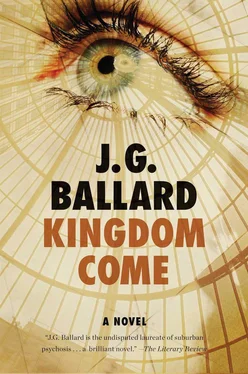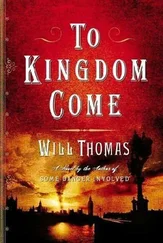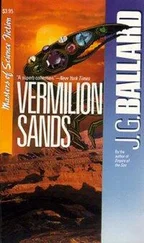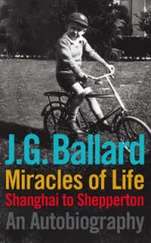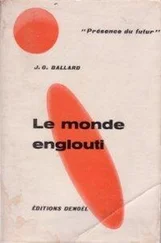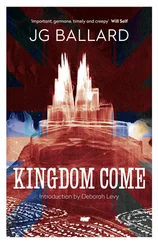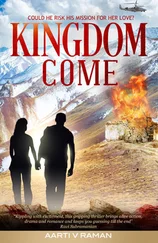Kingdom Come
James Graham Ballard
THE SUBURBS DREAM of violence. Asleep in their drowsy villas, sheltered by benevolent shopping malls, they wait patiently for the nightmares that will wake them into a more passionate world . . .
WISHFUL THINKING,I told myself as Heathrow airport shrank into the rear-view mirror, and more than a little foolish, an advertising man’s ingrained habit of tasting the wrapper rather than the biscuit. But they were thoughts that were difficult to push aside. I steered the Jensen into the slow lane of the M4, and began to read the route signs welcoming me to the outer London suburbs. Ashford, Staines, Hillingdon—impossible destinations that featured only on the mental maps of desperate marketing men. Beyond Heathrow lay the empires of consumerism, and the mystery that obsessed me until the day I walked out of my agency for the last time. How to rouse a dormant people who had everything, who had bought the dreams that money can buy and knew they had found a bargain?
The indicator ticked at the dashboard, a nagging arrow that I was certain I had never selected. But a hundred yards ahead was a slip road that I had somehow known was waiting for me. I slowed and left the motorway, entering a green-banked culvert that curved in on itself, past a sign urging me to visit a new business park and conference centre. I braked sharply, thought of reversing back to the motorway, then gave up. Always let the road decide . . .
LIKE MANY CENTRAL LONDONERS,I felt vaguely uneasy whenever I left the inner city and approached the suburban outlands. But in fact I had spent my advertising career in an eager courtship of the suburbs. Far from the jittery, synapse-testing metropolis, the perimeter towns dozing against the protective shoulder of the M25 were virtually an invention of the advertising industry, or so account executives like myself liked to think. The suburbs, we would all believe to our last gasp, were defined by the products we sold them, by the brands and trademarks and logos that alone defined their lives.
Yet somehow they resisted us, growing sleek and confident, the real centre of the nation, forever holding us at arm’s length. Gazing out at the placid sea of bricky gables, at the pleasant parks and school playgrounds, I felt a pang of resentment, the same pain I remembered when my wife kissed me fondly, waved a little shyly from the door of our Chelsea apartment, and walked out on me for good. Affection could reveal itself in the most heartless moments.
But I had a special reason for feeling uneasy—only a few weeks earlier, these amiable suburbs had sat up and snarled, then sprung forward to kill my father.
AT NINE THAT MORNING,a fortnight after my father’s funeral, I set off from London towards Brooklands, the town between Weybridge and Woking that had grown up around the motor-racing circuit of the 1930s. My father had spent his childhood in Brooklands and, after a lifetime of flying, the old airline pilot had returned there to pass his retirement. I was going to call on his solicitors, see that the probate of his will was under way, and put his flat up for sale, formally closing down a life that I had never shared. According to the solicitor, Geoffrey Fairfax, the flat was within sight of the disused racetrack, a dream of speed that must have reminded the old man of all the runways that still fled through his mind. When I packed away his uniforms and locked the door behind me, a last line would draw itself under the former British Airways pilot, an absentee parent I once hero-worshipped but rarely met.
He had left my strong-willed but highly strung mother when I was five, flown millions of miles to the most dangerous airports in the world, survived two attempted hijackings and then died in a bizarre shooting incident in a suburban shopping mall. A mental patient on day release smuggled a weapon into the atrium of the Brooklands Metro-Centre and fired at random into the lunch-hour crowd. Three people died, and fifteen were injured. A single bullet killed my father, a death that belonged in Manila or Bogotá or East Los Angeles, rather than in a bosky English suburb. Sadly, my father had outlived his relatives and most of his friends, but at least I had arranged the funeral service and seen him off to the other side.
As I left the motorway behind me, the prospect of actually turning the key in my father’s front door began to loom in the windscreen like a faintly threatening head-up display. A large part of him would still be there—the scent of his body on the towels and clothes, the contents of his laundry basket, the odd smell of old bestsellers on his bookshelves. But his presence would be matched by my absence, the gaps that would be everywhere like empty cells in a honeycomb, human voids that his own son had never been able to fill when he abandoned his family for a universe of skies.
The spaces were as much inside me. Instead of dragging around Harvey Nichols with my mother, or sitting through an eternity of Fortnum’s teas, I should have been with my father, building our first kite, playing French cricket in the garden, learning how to light a bonfire and sail a dinghy. At least I went on to a career in advertising, successful until I made the mistake of marrying a colleague and providing myself with a rival I could never hope to beat.
I reached the exit of the slip road, trailing a huge transporter loaded with micro-cars, each shiny enough to eat, or at least lick, toffee-apple cellulose brightening the day. The transporter paused at the traffic lights, an iron bull ready to rush the corrida of the open road, then thundered towards a nearby industrial estate.
Already I was lost. I had entered what the AA map represented as an area of ancient Thames Valley towns—Chertsey, Weybridge, Walton—but no towns were visible around me, and there were few signs of permanent human settlement. I was moving through a terrain of inter-urban sprawl, a geography of sensory deprivation, a zone of dual carriageways and petrol stations, business parks and signposts to Heathrow, disused farmland filled with butane tanks, warehouses clad in exotic metal sheeting. I drove past a brownfield site dominated by a massive sign announcing the Heathrow South extension with its unlimited freight capacity, though this was an empty land, where everything had already been sent on ahead. Nothing now made sense except in terms of a transient airport culture. Warning displays alerted each other, and the entire landscape was coded for danger. CCTV cameras crouched over warehouse gates, and filter-left signs pulsed tirelessly, pointing to the sanctuaries of high-security science parks.
A terrace of small houses appeared, hiding in the shadow of a reservoir embankment, linked to any sense of community only by the used-car lots that surrounded it. Moving towards a notional south, I passed a Chinese takeaway, a discount furniture warehouse, an attack-dog kennels and a grim housing estate like a partly rehabilitated prison camp. There were no cinemas, churches or civic centres, and the endless billboards advertising a glossy consumerism sustained the only cultural life.
ON MY LEFT,traffic moved down a side street, family saloons hunting for somewhere to park. Three hundred yards away, a line of shopfronts caught the sun. A suburban town had conjured itself from the nexus of access roads and dual carriageways. Rescue was offering itself to a lost traveller in the form of neon signs outside a chain store selling garden equipment and a travel agent advertising ‘executive leisure’.
I waited for the lights to change, an eternity compressed into a few seconds. The traffic signals presided like small-minded deities over their deserted crossroads. I lowered my foot onto the accelerator, ready to jump the red, and noticed that a police car was waiting behind me. Like the nearby town, it had materialized out of the empty air, alerted by the wayward imagination of an impatient driver in a powerful sports car. The entire defensive landscape was waiting for a crime to be committed.
Читать дальше
Конец ознакомительного отрывка
Купить книгу
